Photographs: Fayaz Aziz/Reuters
Tahir Ali looks back at the disturbing history that has made suicide attacks a nightmarish part of Pakistan's present reality
Fidayeen or suicide attackers have become a lethal weapon for the Pakistani Taliban. According to a recent report, Pakistan has witnessed more suicide attacks than any other country in the world.
The last decade of the country's history has witnessed the worst bloodshed thanks to a spate of suicide bombings across the country.
Though suicide attacks are undoubtedly an alarming sign for Pakistan, it is the emergence of female suicide bombers that has worried security agencies. It is easier for burqa-clad women to reach their targets as they can't be searched by male security guards.
Between 2001 and 2011, Pakistani militants carried out 130 suicide attacks that resulted in the deaths of 1,883 people while 3,819 people sustained injuries.
Pakistani terrorists learnt the deadly skill of suicide bombing from their Afghan counterparts.
The man who started the deadly practice
Image: Qari Hussain MehsudSuicide blasts were first used to spread terror during the Iraqi insurgency, where bombers had reduced the country to a state of chaos.
In Afghanistan, a suicide bomber is called Ishtihadi -- a person with a strong desire for paradise.
Terrorist Mullah Dadullah was the main architect behind the increasing number of suicide raids against Afghan and Western troops in southern Afghanistan.
Though Mullah Dadullah was killed in May 2007 in a raid by the North Atlantic Treaty Organisation in Kandahar, the trend of suicide bombing introduced by him continues to terrorise the world.
Dreaded Taliban Commander Qari Hussain Mehsud (who was killed in October 2010) encouraged the growing trend of Fidayeen bombings in Pakistan. After receiving training for suicide blasts from Chechen instructors, he established a Fidayeen training camp in Waziristan.
He then started the process of recruiting, training and indoctrination of youth to multiply the number of suicide bombers.
'Walking bombs' target Pakistani forces
Image: The blood-stained marble floor of the Data Darbar Sufi shrine in Lahore, hours after a suicide blastPhotographs: Fayaz Aziz/Reuters
Qari Hussain, the cousin of Tehrik-e-Taliban Pakistan leader Hakimullah Mehsud, also formed the Fidayeen-e-Islam (a squad of suicide bombers) that has wreaked havoc on Pakistani security forces and their installations.
Suicide bombers trained by Qari Hussain have not only carried out attacks in Pakistan but also across the border in Afghanistan.
After Qari Hussain's death, the TTP claims to have trained 2,800 suicide bombers across the country. These 'walking bombs' usually target Pakistani security forces, politicians and bureaucrats.
TTP spokesperson Azam Tariq says, "Our ulemas have termed suicide attacks as an elite form of jihad. Fidayeen is a sophisticated weapon for the Mujahideen; our enemies have no idea how to counter these attacks. Suicide attacks have made the Mujahideen invincible."
The 'holiest form of jihad'
Image: A woman mourns her mother who was killed during suicide bomb attacks in Dera Ghazi KhanPhotographs: Fayyaz Hussain/Reuters
After the tribal areas, Swat Valley was the next region to experience the horrors of suicide bombing in 2007 as Maulana Fazlullah aka Mullah Radio was fighting Pakistani security forces.
Dreaded Swat terrorists Fatih Ustad and Ibni Amin received training from Qari Husain in Waziristan and trained suicide bombers in Swat valley. The first attack in the valley took place near Tableeghi Markaz and was carried out by a young militant named Miraj. Since then, the restive valley has witnessed suicide attacks on a large scale.
Maulana Fazlullah, the reclusive Taliban leader from Swat valley, terms a suicide attack as the 'holiest form of jihad'.
'There is no solution to fidayeen'
Image: A man cordons off the site of a suicide bomb blast in KarachiPhotographs: Akhtar Soomro/Reuters
In the forth volume of jihadi CDs released by the Swat Taliban, the Maulana says, "There are two types of weapons, physical and spiritual. No spiritual weapon is available with the kafir and baydin (those without any faith) and maadi (physical) weaponry are always in great numbers with the infidels. He who considers jihad as part of Islam will make preparations. Like ablution is a must for prayer, training for jihad and making of barood (dynamite) are necessary practices for the mujahideen.
"I always say to my fellow colleagues that if there is a little barood with someone, he could run and the world will not be able to compete. And after all, for fidayeens, a major power is that of ihsaan (kindness) of Rab (God). People are astonished, the US is astonished, and all the Aalami Kufr (the world of infidel) is astonished. Who can confront the fidayeen? There is no way to compete with him. The infidels have confessed that there is no solution to fidayeen."
Initially, some sections of the Pakistani Taliban were reluctant to carry out suicide attacks, but some books written by hard-line clerics in favour of the fidayeen paved way for the militants to adopt this practice.
'Fidayeen attacks are the key to success'
Image: Books that encourage suicide attacksPhotographs: Adrees Latif/Reuters
One such popular book supporting suicide attacks is Islam aur Fidai Hamlay (Islam and suicide attacks) by Mufti Abdul Bashar Qasmi from Bangladesh. The book was first released in Dhaka and then made its way to Karachi.
In 2007, the Sindh government ordered that all copies of the book be forfeited with immediate effect. According to the government, the book contained propaganda material for militant organisations that motivated people to carry out suicide bombings.
In its preface, Bashar writes, "Fidayeen attacks are the key to success in Jihad. The importance of fidayeen is witnessed in the Quran, the Sunnah and inside the deeds of the companions of Prophet Muhammad. For decades, this practice had been invisible but now the resolute mujahideen are reviving the fidayeen trend in Jihad. Through fidayeen, they have made the life of infidels miserable. This book is aimed at bringing the mujahideen to the right path of suicide attacks."
'Muslims would be left with nothing'
Image: Men carry coffins of victims killed in a suicide bomb attack in Kohat in northwestern PakistanPhotographs: K Parvez/Reuters
Another book released by Al-Badar Mujahedeen, titled Rah e Wafa, also describes the suicide attack as a 'just practice'. The book is written by Muhammad Siddiq Ahmed who favours fidayeen attacks against infidel forces and terms it a lethal weapon for the jihadis.
Ahmed writes, "In this era of modern technology, the infidel forces enjoy all the latest weaponry and the mujahideen cannot defeat them with their limited resources in a face-to-face battle. If the mujahideen secretly enter the camps of the enemies and carry out suicide attacks, it could make them successful. If someone tried to stop the fidayeen from suicide attacks, the Muslims would be left with nothing and they would be completely enslaved by the infidels. Those who are creating hurdles in the way of suicide attacks (like terming it an un-Islamic practice) are taking the whole Muslim Ummah to destruction."
When suicide bombers started targeting US-led NATO forces inside Afghanistan, literature about fidayeen was easily available in Pakistani markets. But when suicide bombers started attacking Pakistan security forces and their installations, these were banned.Maulana Masood Azhar supported suicide attacks
Image: Tractors move rubble from the site of a suicide bomb blast in Pakistan's Pashtun tribal regionPhotographs: Reuters
Incidentally, even Maulana Masood Azhar, a 'good Taliban' commander, has written a number of articles supporting suicide attacks.
To discourage the growing trend of suicide attacks inside Pakistan, the government has taken help from some pro-government and moderate clerics, but so far, these efforts have been unsuccessful.
Dr Muhammad Tahir ul Qadri -- on March 2, 2010 -- released a fatwa against fidayeen attacks. He stated that those who have wreaked havoc through bomb blasts and suicide bombings are not Muslims. They belong to the Khawarij school of thought; it was the first group that attacked the fourth Caliph Hazrat Ali and founded the tradition of killing and violence under the pretext of establishing Quranic rule.
According to Dr Qadri, more than one hundred Prophetic traditions clearly denounce the Khawarij and declare them out of the circle of Islam.
'We don't want to target civilians'
Image: Family members look after a man who was injured in a suicide bomb attack in northwest Bajaur regionPhotographs: Adrees Latif/Reuters
In retaliation, the Pakistani Taliban never spared pro-government clerics and targeted them consistently. They killed Allama Sarfaraz Naeemi in Lahore in 2009 and Maulana Hassan Jaan in Peshawar in 2007. Both clerics had spoken out against suicide attacks.
The Muttahida Jihad Council, which is striving for the 'freedom' of Kashmir, is also against fidayeen attacks. The council terms the suicide attack as an un-Islamic practice as civilians are often the victims of such attacks.
In a recent interview to a jihadi weekly, MJC chairman Syed Salahuddin said, "We are against any type of suicide attacks. We only believe in jihad under the guidance of the Quran and the Hadith."
He added, "We don't want to target civilians (through suicide attacks). Our main target are Indian forces in Kashmir and for them, guerrilla warfare is the best option."

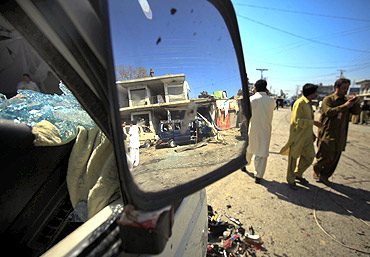
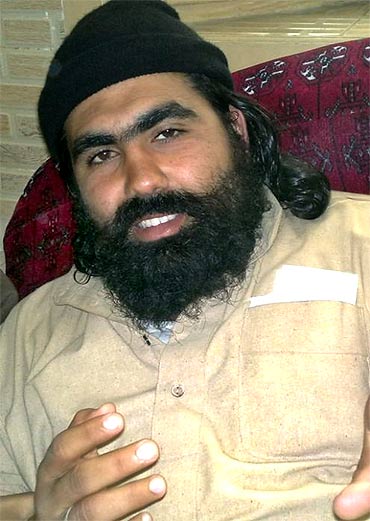
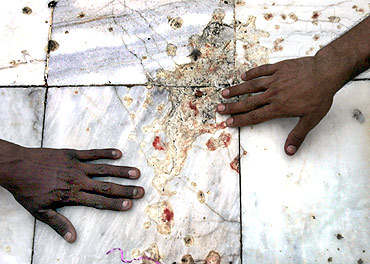
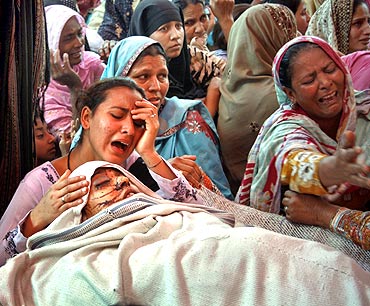
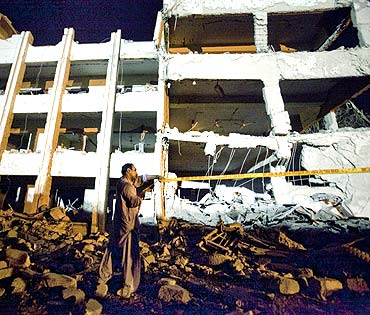
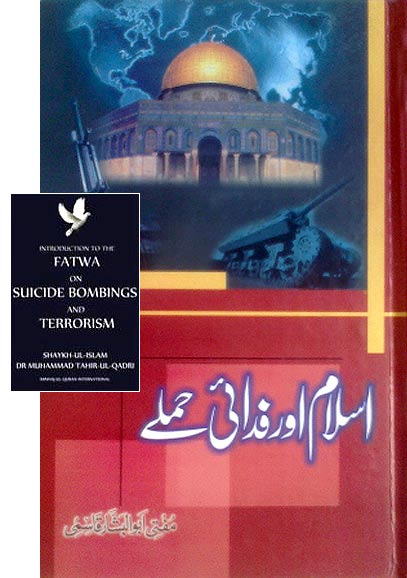
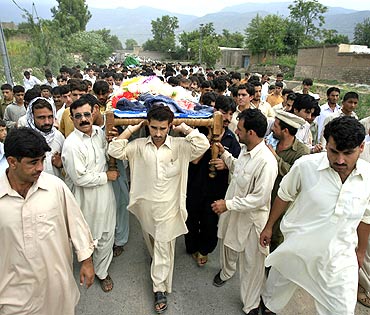
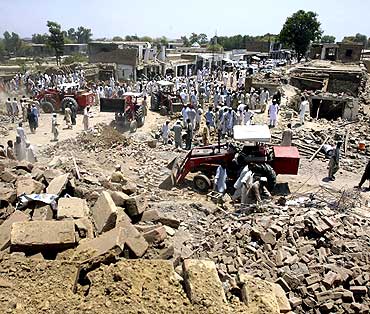
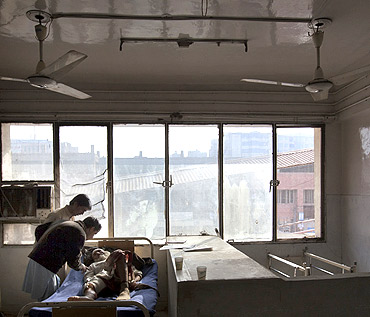
article